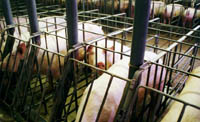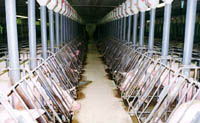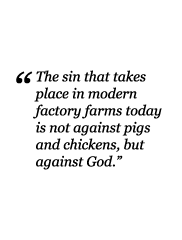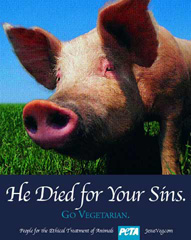OldSpeak
Jesus vs. Dr. Atkins: A Christian Argument for the Ethical Treatment of Animals
By Joshua S. Anderson
June 18, 2004
Our country has always been a nation of meat-eaters. In fact, specific meats are synonymous with each of our national holidays—burgers on Independence Day, turkey on Thanksgiving and ham on Easter. Americas’ obsession with meat, however, may have reached something of a historical high in recent years through a combination of efficient production, inexpensive prices and the increasing popularity of the "Atkins diet." Meat is cheap, patriotic and best of all, we now find, good for us in massive quantities—and its consumption has established sound financial footing for the growth of meat manufacturers and veritable pork, chicken and beef factories.
Generally, the morality of all this is treated with little interest by the general Christian public. For example, we know, with little knowledge of the details, that animals are raised en masse for slaughter, which doesn’t bother us much. Animals are made to be eaten, we think—it’s just the way things are.
It is no stretch to state that the typical American Christian is essentially ignorant about the methods used to produce the meat he buys every week in the supermarket and that it bothers him not at all. But the treatment of animals and, indeed, all of creation, is not peripheral to God, for rightfully exercised authority over all creation is at the heart of God’s plan for humanity. And the lack of a well-thought Christian ethic regarding the treatment of animals in our modern culture of mass meat production and consumption is evidence not of its non-importance but, rather, of the apathy of the modern church.
 |
 |
Of course, there is also a strong reaction to all this—with groups such as People for the Ethical Treatment of Animals (PETA) demanding that our culture respect the "rights" of animals. And the practice of not eating meat at all is undeniably spreading—it is hardly remarkable anymore to sit down for a meal with a vegetarian or vegan, especially among the nation’s youth. These days, PETA is even employing Christian symbols and theology in advertising their position (JesusVeg.com), emphasizing the "non-violent" Christ who presumably would no sooner harm a fly than he would eat a lamb. (This view of Jesus ignores, of course, the scriptural record of Christ’s participation in Jewish religious life, which demanded the ritual slaughter of animals.) Also suspect about PETA’s "Christian" vegetarianism is how pleased they are to also quote Buddhist or Hindu teachers on the subject—implying that their true religion is the protection of animals and their embrace of Christianity goes only as far as they perceive it to support their other beliefs.
Thankfully, Mathew Scully’s recent book, Dominion, has taken an important step toward a coherent Christian thinking in this area. As the title implies, Scully’s book is primarily concerned with the implications of God’s first command to man, which is recorded in Genesis 1:28, "And God blessed them, and God said unto them, ‘Be fruitful, and multiply, and replenish the earth, and subdue it: and have dominion over the fish of the sea, and over the fowl of the air, and over every living thing that moveth upon the earth’" Scully’s book is worth reading on many levels—it is part journalism, as well as theology (some of which is a little suspect). But one of the best things he does is frame the debate where it should be framed. The fundamental question he poses regarding our treatment of animals is not whether animals have "rights" and whether those "rights" are being respected but, rather, whether God’s first command to man is being obeyed. As Christians, our ethical sense must begin and end with the Word of God—and human treatment of animals is not an area where God is silent. But before we review the Word, we should reflect on the current situation.
The days of small-scale family farming where animals enjoyed some freedom of movement and standard of care has long passed by and given way to billion-dollar corporations which inevitably choose profit over animal care—and the cruelties those animals endure are substantial. In March of 2002, a representative of a watchdog group concerned about the public health implications of factory farms described, before a U.S. Senate Committee, the living conditions of hogs that produce the vast majority of pork products eaten by Americans:
Factory meat production is an industrial rather than an agricultural enterprise. Animal husbandry is nonexistent. Industrial pork barons produce pork chops and bacon and the animals themselves are treated only as industrial production units. Genetic manipulation for meat production has produced hog breeds that are high strung and nervous. They live short miserable lives characterized by extreme cruelty and extreme terror.
By nature, pigs are active, inquisitive and intelligent, and they spend much of their time exploring ground cover and rooting for food. They are communal animals with a highly developed system of vocalization that they use in courtship, self defense and raising their young. The female pig, the sow, has a strong instinct to build a nest before giving birth. She will wean her young for several months and take care of them even longer.
In industrialized hog factories, pigs are raised in intensive confinement for their entire lives in huge windowless structures choked by their own foul stenches. Subject to disease from overcrowding and entirely deprived of exercise, sunlight, straw bedding, rooting opportunities and social interactions that are fundamental to their health, factory hogs are kept healthy only by constant doses of subtherapeutic antibiotics. Their growth rates are unnaturally sped-up by feed additives including antibiotics, hormones and toxic metals. Sows endure in tiny crates that are too small for them to turn around, giving birth on bare metal grate floors, their babies taken away after only three weeks of weaning. Driven by frustration and depression, sows continually gnaw on the metal bars of their crates. Severe restrictions on the pigs’ movement over a lifetime impede bone development frequently resulting in broken legs. Injured pigs are "culled" sometimes by being dumped alive into waste lagoons. There are many accounts of brutal treatment of these animals, including teeth pulling, castration without anesthesia, and beating disabled sows unable or too terror stricken to walk to slaughter. According to the U.S. Humane Society, one in five of all factory-raised pigs die prematurely, before reaching the slaughterhouse.
 |
 |
Though the testimony is harrowing, it is, on some level, understandable. If one accepts that there is no ethic which should guide our treatment of animals, it is not surprising that a company which operates to create profit would treat the animals as simply "production units" and show no regard to their care. But the question remains—should there be such an ethic? Is any treatment of animals that benefits human life (in this case, lower-priced meat) justified? Is God offended by the modern treatment of hogs? Is it wrong to purchase and eat animals raised in such a way? For the answer to those concerns, we must turn to the biblical record.
To begin with, we can state with confidence that God sees and knows the conditions and life of every animal in every factory farm. As Christ said, "Are not five sparrows sold for two farthings, and not one of them is forgotten before God?" The rest of Christ’s statement—"And are you not more valuable than two sparrows?"—implies another important point; that is, humanity is uniquely valuable to God, over and above the rest of creation. It is humans, not sparrows, who are created in God’s image. And it is humans, not sparrows, that Christ will raise from the dead on His return.
There is also no question about animals’ subservient relationship to humans. As noted earlier, God commanded human beings to take authority and dominion over all of creation, including its creatures. Inherent in this point, though, is another—biblically speaking, authority comes both with privileges as well as responsibilities. We find no blank checks for power in Scripture—in fact, God reserves some of His harshest judgment for those in authority. King David, whose power came explicitly from God, was also judged by God when he used that authority to take another man’s wife and kill her husband. Thus, it is folly to think that humanity’s authority over animals does not come with similar responsibilities, as well as similar consequences if that authority is abused. What then are God’s expectations for our treatment of creation?
To begin, it can easily be argued that there is nothing inherently wrong with the slaughter of animals for human consumption. The Gospels record Jesus eating fish, and God sent a great flock of quail for the Israelites to eat in the desert when they grew tired of their vegetarian diet (Numbers 11). However, it is also clear that God places limitations on humanity’s authority over animals. For example, God prohibits "boiling a young goat in its mother’s milk" (Deut. 14:21). Inherent in this command is a prohibition on subverting the natural order of creation—mother’s milk is life for a young goat, and to use it to kill him is to pervert and reverse the life-giving purpose of milk.
The implications of this command are devastating for the modern meat industry, for we see that animals are not simply "production units" whose bodies and by-products can be used for whatsoever purpose man desires. The common practice of feeding hogs the ground-up carcasses of other hogs that die in the production process is an obvious violation of that same created order. And it takes little imagination to see the outbreak of Mad Cow Disease as a judgment from God when the same practice was used in feeding cattle. Abuse of God-given authority always has consequences, and I believe that we can confidently say that feeding their own meat to animals will have direct consequences. In the case of Mad Cow, the consequences were the economic destruction of farmers who engaged in that practice and the death of people who ate their cattle. We must respect and maintain the original purposes of creation in all things, for in doing this we respect the creator.
This general principle of maintaining and respecting the order of creation as we practice dominion over it is further explained in another portion of Deuteronomy. There Moses commands the Hebrews, "Do not muzzle an ox while it is treading out the grain" (Deut. 25:4). There is an element of ridiculousness in the command, for Moses is saying that when the Hebrews used an ox to walk on the grain they had harvested, in order to break the grain open and make flour, they were prevented from stopping the ox from eating the grain as he worked. In this situation, men must stand by and watch an animal eat some of the fruit of their own harvest, and this is rightful dominion over the animal. The implication of this command is obvious—an ox should be allowed to be an ox. Although an ox is useful for certain tasks—pulling heavy carts, for example, or treading out the grain to make flour—he is not simply a machine or a "production unit." When an ox is near grain, he naturally eats some, and so should be allowed to do so. This is an inefficient production of grain, and it certainly decreases the amount of food available for the family that owns the ox. But according to God, it is how dominion is to be exercised—in a way that respects the created order that He has established.
Contrast this to the condition of modern sows, which are kept in such small cages that they are not even able to turn around or make a nest for their young—who will never see the light of the sun until they are taken to the slaughter house. Or consider the plight of chickens, whose overcrowded conditions force them to rub against their wire cages constantly so that they appear to have been plucked, never even allowed to flap their wings or walk on the surface of the earth. For all practical purposes, these animals have ceased to be animals—they are simply meat "crops" to be raised and egg-producing machines, treated in a way that perverts their created instincts and is patently unbiblical. If God does not even allow mankind to muzzle an ox when it walks on grain, then certainly the conditions described violate His intention for our dominion over creation; indeed, to the extent that modern industrial farming methods raise and keep animals in a way that "de-animalizes" them, treating them as vegetable crops or machines, they constitute a rebellion against God and should be named sinful in the full sense of the word. It then goes without saying that those who support those farming methods with their pocketbooks participate in that sin and rebellion—and both will be judged as such by God. Indeed, the increasing concern over the public health risks that hog factories, with their vast amounts of hog waste, pose to humans who live near them can be rightly understood as a form of God’s judgment.
 |
 |
At this point it should be made clear that, despite what PETA activists will tell you, human abuse of their authority over animals is not sinful because of the suffering it causes animals but, rather, because of its rejection of God’s created order. The sin that takes place in modern factory farms today is not against pigs and chickens, but against God—for it was God who entrusted humanity with the care of creation and it is God whom we reject when we abuse that authority. If one accepts the validity of these arguments, changes in behavior obviously should be made. One of modern society’s worst conditions is the disconnect between a person and the food he eats, the clothes he wears and the house he lives in, for these material things are then valued only for their utilitarian purpose and this reduction ignores the distinctly moral concerns that surround these intimate details of our lives.
But the Christian should not assume that because there is a disconnection today between himself and the production of the food he eats that he is then not responsible for the ethical production of that food—sin is not somehow lost in the chain of production, sale and consumption, even if we are ignorant of it. As Christians who are responsible before God for rightful dominion over creation, it is our responsibility to investigate the methods used to produce the food we eat—and to boycott food produced in ways that abuse animals by turning them into a crop to be raised or machines that happen to produce eggs. If this means not paying the absolute lowest price for our meat or eggs—well, surely it is better to stand righteous before God than to save a few dollars on a pound of meat.
DISCLAIMER: THE VIEWS AND OPINIONS EXPRESSED IN OLDSPEAK ARE NOT NECESSARILY THOSE OF THE RUTHERFORD INSTITUTE.


